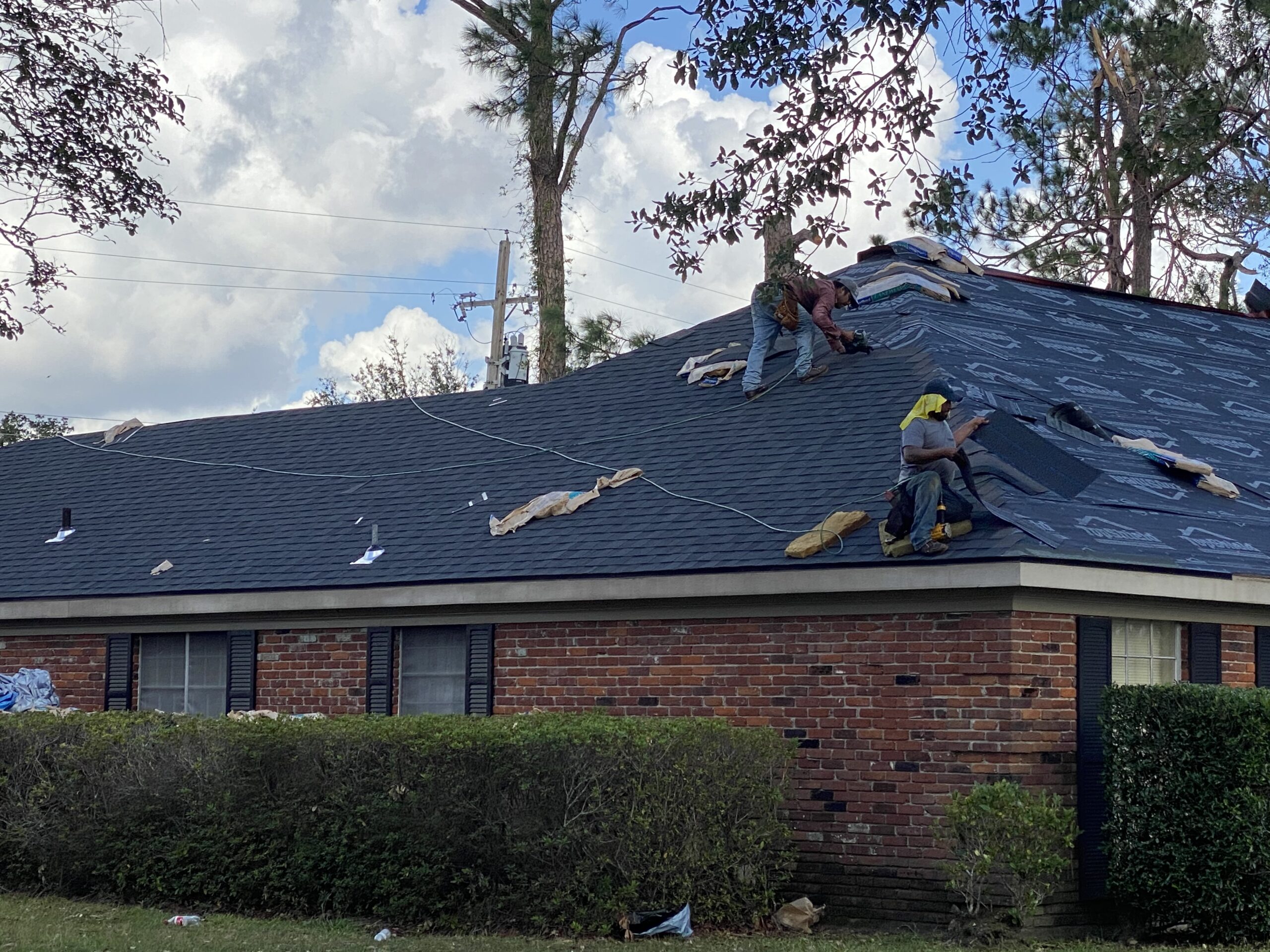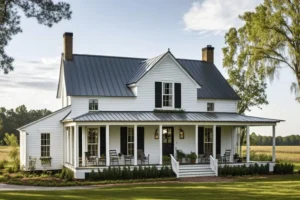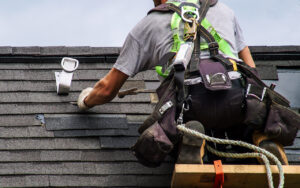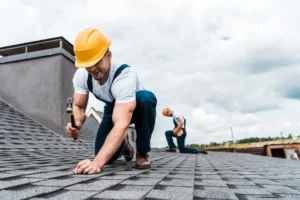Introduction – Cost of New Roof:
Planning for a new roof can be a daunting task, especially when the average cost for a new roof in Houma, LA is around $8,000-$20,000. When it comes to estimating the cost there’s no one-size-fits-all answer to the question, “How much is a new roof in Houma, LA?”. In this article we will help you understand the key factors that influence the cost of a new roof in Houma, LA that can help you make an informed decision. In this educational article, we’ll delve into the various considerations that impact the price of a new roof and provide insights to help you navigate the process.
Roof Size and Complexity: The Foundation of Pricing
The size and complexity of your roof play a significant role in determining the cost. Roofers commonly measure roofs in squares, where a square equals 100 square feet. Roof complexity, often related to angles, pitch, stories, and design intricacies, affects the number of materials required and the labor time. An accurate measurement can be obtained through a professional roof report from services like Eagleview, providing you with essential data to compare estimates effectively.
Quick Fact: On average, roofing material waste accounts for 5-18% of the total surface squares.
Here are the 4 Main factors that can affect the cost of a roof:
- Roof Size: The size of the roof is primary factor impacting the cost. A larger roof will require more materials, labor thus time to complete, whichs results in a higher overall cost.
- Roofing Material: The type of roofing material chosen significantly affects the cost. Different materials have varying prices, durability, aesthetics, and installation requirements. Common roofing materials include asphalt shingles, metal, tile, wood shakes, and slate. Each material has its own price range, with some being more affordable and others more expensive.
- Roof Pitch and Complexity: The steepness or pitch of the roof directly impacts the cost of any roofing service. Pitch, the number of valleys, hips, ridges, dormers, skylights and other design features greatly influence the cost. Roofs with intricate architectural details require additional skilled labor and materials, thus increasing the overall cost.
- Geographic Location: Labor, insurance, and building code requirements are different across the United States. Roofing costs can vary depending on the region or geographic location. Factors such as local market conditions, competition, and material availability can influence the pricing.
Other Minor Factors that Affect the cost of a new roof:
- Removal of Old Roof: If there is an existing roof that needs to be removed before installing a new one, the cost of roof removal and disposal will add to the overall expenses.
- Underlayment and Decking: The condition of the roof’s underlying structure, including the deck and underlayment, can affect the cost. If repairs or replacement of these components are necessary, it will increase the total project cost.
- Local Labor Costs: Labor costs can vary depending on the location and local market conditions. Areas with higher labor rates tend to have higher roofing costs.
- Permits and Regulations: Obtaining necessary permits and complying with local building codes may incur additional costs. It’s essential to ensure compliance with regulations and factor in permit fees during cost estimation.
- Warranty and Additional Services: The type of warranty offered by the roofing contractor or manufacturer can impact the cost. Extended warranties or additional services, such as roof maintenance plans, may involve extra expenses.
- Accessibility: The accessibility of the roof can affect the overall cost. If the roof is challenging to access, such as in multi-story buildings or with limited maneuverability, it may require special equipment or additional labor, resulting in higher costs.
Location: A Price Point Influencer
Your geographical location has a substantial impact on the cost of a new roof. Different areas have varying building codes, material costs, and labor rates. Using Xactimate, an insurance-preferred estimating software, here’s a sample price range for common locations:
- New York: $670 per square
- Chicago: $496 per square
- Louisiana (Houma): $443 per square
- Florida: $450-600 per square
These estimates consider a basic 20 square gable roof with standard building codes and materials. Keep in mind that prices might differ based on local factors and specific requirements.
Insurance Claims vs. Cash Deals: The Pricing Shift
The source of funding for your new roof influences the price. After a storm, increased demand for roofing services can drive up prices. Insurance claims often result in higher restoration payments due to considerations of quality, material costs, and labor. On the other hand, cash deals, where homeowners foot the bill, tend to be more competitive. Roofers might adjust their prices to cater to the price-sensitive consumer.
Materials and Accessories: Quality Matters
The materials used for your new roof significantly impact the cost. From shingles to nails, every component contributes to the overall expense. Quality accessories and proper installation are vital for a long-lasting roof. Ensure that your contractor lists the specific products and brands they’ll be using. Cutting corners on materials can compromise your roof’s durability and potentially void manufacturer warranties.
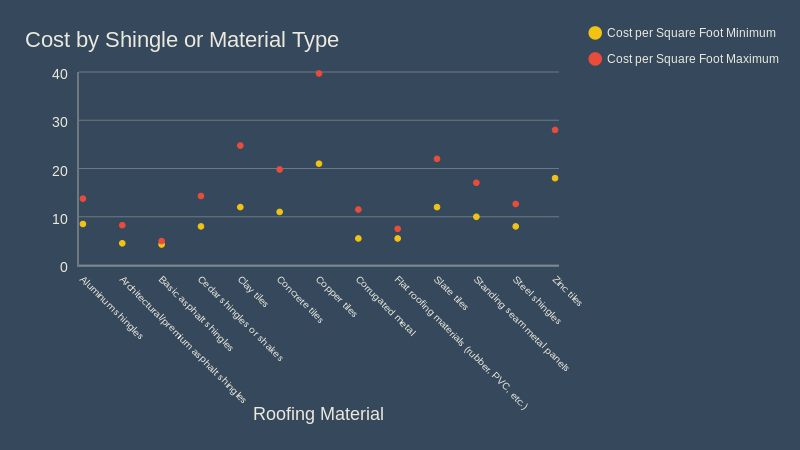
Quick Fact: Using unapproved accessories can void your manufacturer’s warranty.
Cost by material type
The cost of a roof can vary significantly depending on the type of roofing material chosen. Here are some common roofing materials along with their approximate cost ranges per square foot of coverage (including materials and installation):
1. Asphalt Shingles: Asphalt shingles are the most popular roofing material due to their affordability and ease of installation. The cost ranges from $3 to $7 per square foot.
2. Metal Roofing: Metal roofs are known for their durability and longevity. The cost can vary depending on the type of metal used, such as steel, aluminum, or copper. On average, metal roofing can cost between $8 and $15 per square foot.
3. Clay or Concrete Tiles: Clay or concrete tiles offer a unique and aesthetically pleasing appearance. However, they tend to be more expensive compared to other roofing materials. The cost ranges from $10 to $20 per square foot.
4. Wood Shakes or Shingles: Wood shakes or shingles provide a natural and rustic look but require more maintenance. The cost typically falls between $8 and $14 per square foot.
5. Slate: Slate roofs are highly durable and offer a distinctive and elegant appearance. However, they are one of the most expensive roofing options. The cost can range from $20 to $40 or more per square foot.
It’s important to note that these cost ranges are approximate and can vary based on factors such as location, roof complexity, contractor rates, and market conditions. Additionally, additional costs for underlayment, flashing, ventilation, and installation may apply.
When planning a roof replacement or installation, it’s advisable to consult with roofing contractors and obtain detailed estimates specific to your project and chosen material. They can provide more accurate cost information and help you make an informed decision based on your budget and desired roofing material.
Roof Pitch and Complexity Costs
The complexity of a roof not only influences its size but also contributes to the overall architectural design and aesthetics of a building. Different designs can create varying visual effects, enhance curb appeal, and accommodate specific architectural styles but also increase the price due to difficulty of instalation or the necessity for more waste or (added material costs).
The pitch of a roof refers to the slope or steepness of the roof surface. It is typically expressed as a ratio of vertical rise to horizontal run. The pitch of a roof plays a significant role in determining the size or area of the roof. Here’s how the pitch affects the size of the roof:
1. Relationship between Pitch and Roof Area:
The pitch of a roof affects the overall surface area of the roof. A steeper roof pitch requires more materials and covers a larger area compared to a roof with a lower pitch. This is because as the slope increases, the roof extends higher and covers more horizontal space.
2. Effect on Roof Measurements:
When measuring the dimensions of a roof, the pitch needs to be taken into account. The actual measurements of the roof will be larger than the horizontal dimensions due to the vertical rise caused by the pitch. For example, a roof with a 6:12 pitch (6 units vertical rise for every 12 units horizontal run) will have a larger surface area compared to a roof with a 4:12 pitch.
3. Roofing Material Requirements:
The pitch of a roof also affects the selection and installation of roofing materials. Steeper pitches may require additional considerations and specialized materials to ensure proper waterproofing and stability. Some roofing materials, such as certain types of shingles or tiles, may be more suitable for specific roof pitches due to their design and installation requirements.
In summary, the pitch of a roof affects the size or area of the roof due to the increased surface area resulting from a steeper slope. It also influences the selection of roofing materials and plays a crucial role in the overall design and appearance of a building. Consulting with a professional roofer or architect can help ensure that the roof pitch is appropriately considered in determining the size and other aspects of the roof for a successful roofing project.
Choosing the Right Roofing Contractor
The roofing contractor you choose can affect both the quality of work and the cost. Unlicensed and uninsured “Chuck-in-a-truck” options might offer lower prices but carry higher risks. Legitimate contractors, while often more expensive, provide assurance of quality work, adherence to codes, and warranties.
Quick Fact: Many roofing contractors use the same subcontractors for installation.
Summary: The Price Range for Your New Roof
In summary, the cost of a new roof in Houma, LA, varies due to multiple factors. While specific prices may fluctuate, you can expect to pay between $400 and $500 per square for an asphalt roofing system. Specialty roofs like metal can command even higher prices. Understanding these considerations empowers you to make an informed decision and prioritize the longevity and protection of your home.
If you need assistance selecting a reputable roofing contractor, check out our dedicated article on the subject. For residents of Texas or Louisiana, feel free to explore our roofing company here.
Remember, investing in a quality roof is an investment in the safety and value of your home. Good luck with your roofing journey!

